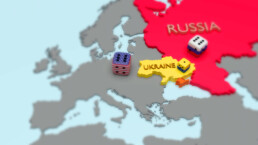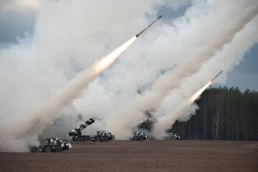When two countries with nuclear arsenals are having a conflict, choosing rhetoric over diplomacy is a mistake.
By Andrei P. Tsygankov, Canadian Dimension
The international crisis around Ukraine is far from over, but it has now revealed a problem at the very top of the Biden administration. In its relations with Russia, the president has prioritized pressures, threats, and rhetorical escalation over dialogue and negotiations.
The Kremlin has contributed to the crisis by surrounding Ukraine with troops from the southern, eastern, and northern directions. These actions have served to intimidate Russia’s neighbours and the Western states in the NATO coalition. Russian President Vladimir Putin did not hide his intention to create “tensions” with the West in order to draw attention to Russia’s security concerns.

However, the root cause of the crisis extends beyond Putin. Independent observers including some of the United States’ European partners acknowledge that Russia’s legitimate security interests in Europe have not been taken into consideration following the end of the Cold War.
The eastern expansion of Western military infrastructure accompanied by NATO enlargement and the alliance’s refusal to consider Russia’s multiple security proposals since the 1990s have now reached their limit. Russia’s main demands—an end to NATO expansion, the non-deployment of military infrastructure in the former Soviet states, and withdrawal of Western troops to 1997 positions—deserve to be discussed. These continent-wide security negotiations are long overdue.
Recent Posts
Mayor Mamdani’s First Day, A Zero Hour Conversation With Richard Wolff
July 2, 2025
Take Action Now If elected, what would Mayor Mamdani do on his first day in City Hall? How would a democratic socialist govern as a big-city mayor?……
The U.S. Is Funding A Bloodbath At Gaza Aid Centers
July 2, 2025
Take Action Now The admin just gave $30M to GHF, the organization at the center of charges that Israel is weaponizing assistance and shooting at…
Feeding The Warfare State
July 1, 2025
Take Action Now We Lose, the Weapons Makers WinBy William D. Hartung, Tom Dispatch The Senate is on the verge of passing the distinctly misnamed…
The Rage Of Billionaires And The Frenzy To Stop Zohran Mamdani From Becoming New York’s Mayor
June 30, 2025
Take Action Now The constellation of forces now regrouping with a vengeance includes titans of Wall Street, enormous real estate interests,…




